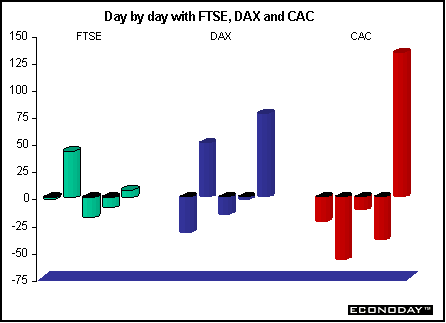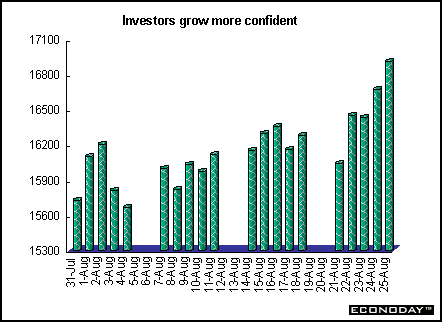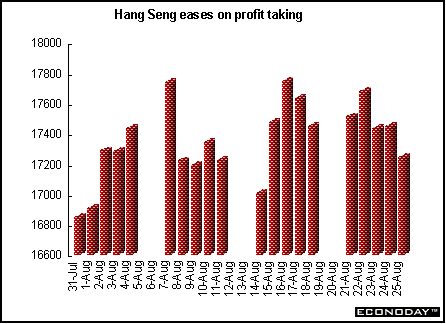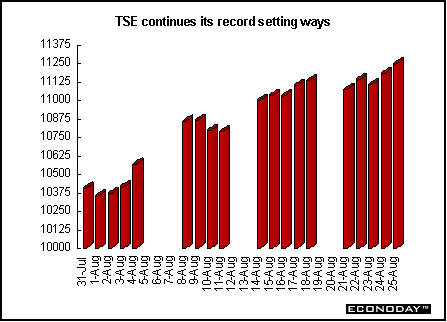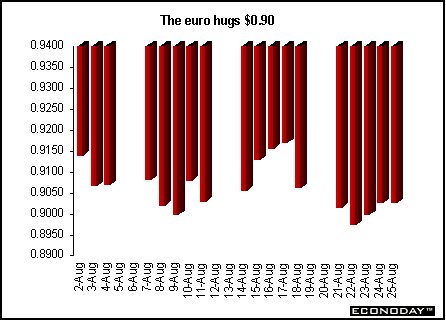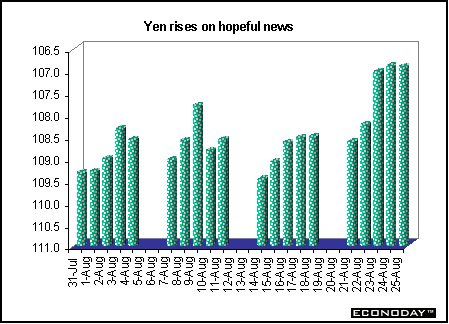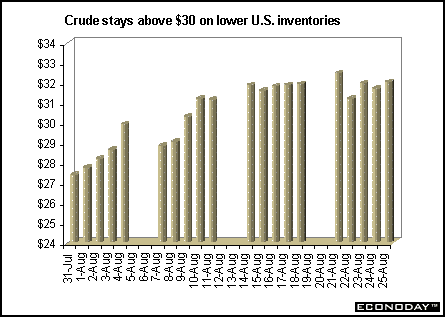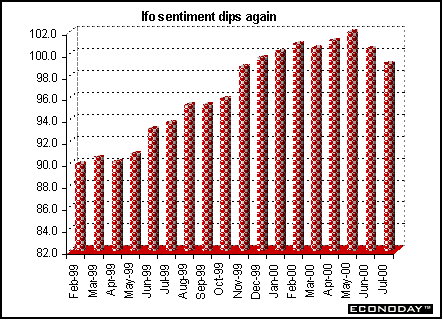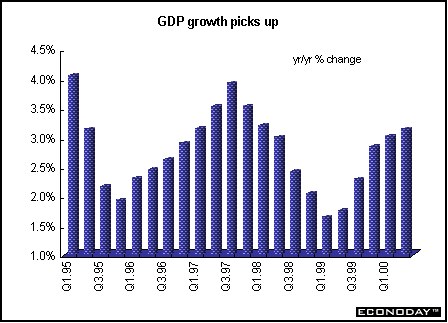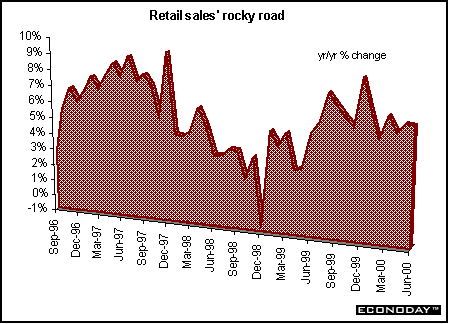| Previous Articles |
|
Next at bat - the ECB
Europe and Britain
In London, the FTSE 100 continued its meandering ways - up one day and down the next - as traders waited for summer's end. Another Bank of England meeting is looming the first week in September. With monetary policy committee opinion about the need to raise interest rates split at the August meeting, investors will be watching to see if the majority swings to the upside this time around. The Bank of England last increased rates in February. The FTSE 100 ended the week at 6543.70, up a mere 20 points or 0.31 percent.
The Frankfurt DAX continued to be bothered by the big wireless price tags and took it out on the companies involved in the bidding. In the markets' view, the companies squeezed their own profit margins by paying too much for the privilege to invest in an infrastructure that will take several years to build. Despite the unsettled market earlier in the week, fears calmed and the DAX rebounded on Friday and ended the week up about 74.75 points or 1.03 percent at 7307.17.
Paris CAC, after a record setting week, eased as investors took profits. They also were worried about the costs of wireless service rights for the telecommunications companies down the road. But on Friday the CAC rebounded from earlier losses and managed to pull about even on the week at 6595.11.
Asia In Japan, after a hesitant start, investors grew more confident at the week wore on. The Nikkei 225 surged, lifted by technology companies because of strong semiconductor demand, upbeat earning forecasts and U.S. Nasdaq gains. Foreign investors are also taking an interest in Japanese companies once again on expectations of promising economic news. The Nikkei ended the week at 16,911.33, up 630.84 points or 3.87 percent.
Hong Kong Hang Seng index dropped 203.26 points or 1.17 percent to 17,236.74 as investors held their collective breaths waiting for the outcome of the FOMC meeting. After recent increases especially in property shares, investors were reevaluating their options and taking profits from recent gains.
Americas
Currencies
The euro sank to near its all time low because of the disappointing German Ifo sentiment survey released mid-week. It slithered up over 90 cents again when U.S. data indicated slower growth. Despite the hawkish talk about inflation this week, which all but ensures a rate increase, the euro continues to founder on the shoals of investor opinion. In contrast, the yen rallies with little provocation. With the Bank of Japan's interest rate increase behind them and no information on its impact on the economy available yet, market players search for kernels of positive economic news. Just ahead is the highly anticipated second quarter gross domestic product report for September. However, these data are notoriously unreliable. Exporters are also playing a role in lifting the yen as they begin to repatriate profits before the end of the first half of the Japanese fiscal year (September 30). Increased foreign interest in equities is adding to the demand for yen also.
Oil prices a worry again
Oil once again an economic threat, the political maneuvering has begun as energy ministers hold bilateral meetings with non-OPEC members Norway and Mexico in preparation for the September 10 ministers meeting. According to Nigeria, OPEC members will discuss whether to raise production at the group's ministerial meeting. However OPEC Secretary General Rilwanu Lukman said oil producers will intervene in the market only when it is in the interest of all members. Consuming nations will be looking for increased production, especially from Saudi Arabia.
Indicator scoreboard July producer price index rose 0.7 percent and 3.3 percent when compared with last year. Excluding oil prices, the PPI was up 0.6 percent on the month and 2.2 percent on the year. Oil products prices rose 1.2 percent on the month and 29.3 percent on the year. Over the last six months, the seasonally adjusted PPI has grown at an annualized rate of 4.0 percent, up from the 3.7 percent rate in the six months to June. Excluding energy the PPI rose 0.2 percent on the month and 2.0 percent on the year.
July import prices rose 0.4 percent and 10.9 percent when compared with last year. The increase in overall import prices was caused mostly by a rise in commodity import prices excluding oil (up 0.7 percent), while energy import prices remained flat. Among July import price categories, prices for imported basic and semi-finished goods rose 0.7 percent on the month and 21.5 percent on the year. Seasonally adjusted import prices jumped 0.5 percent in July and 10.9 percent when compared with last year.
Preliminary seasonally adjusted consumer prices for the six months to August rose at an annualized rate of 1.7 percent, down from the 2.1 percent rate seen in the previous two months.
France - June seasonally adjusted merchandise trade surplus narrowed to E1.122 billion as exports fell 1.1 percent while imports rose 1.5 percent. First half 2000 seasonally adjusted trade balance totaled E4.918 billion, down 42.5 percent from the previous year. Second quarter seasonally adjusted exports rose 5.1 percent on the quarter and 16.7 percent on the year. Second quarter seasonally adjusted imports climbed 3.8 percent on the quarter and 19.6 percent on the year.
Britain - Second quarter gross domestic product rose 0.9 percent and 3.1 percent on the year. Output of the service sector was revised down to 0.9 percent on the quarter and 3.5 percent on the year. Household expenditure rose 0.8 percent on the quarter and 3.7 percent on the year. Government expenditure rose 1.9 percent on the quarter and 1.7 percent on the year. This was the strongest quarterly growth rate since the second quarter of 1991. Production industries output rose 1.4 percent on the quarter and 2.2 percent on the year. Within this, the manufacturing sector rose 0.4 percent on the quarter and 1.8 percent on the year. Construction output fell 0.7 percent on the quarter but was still up 3.5 percent on the year.
July non-EU merchandise trade deficit widened to a record Stg2.795 billion from Stg2.146 billion in June. Exports to non-EU countries were down 8.7 percent on the month while imports were up 0.6 percent. But the non-EU deficit excluding oil and erratics was also at a record monthly level at Stg2.3 billion versus Stg2.0 billion in June. June global goods deficit narrowed to Stg2.277 billion from Stg2.349 billion in May. Within this total, the deficit with countries in the European Union narrowed sharply to Stg131 million. The narrowing mostly was due to a rise in exports of cars, intermediate and capital goods. The total deficit on both goods and services in June stood at Stg1.219 billion compared with Stg1.187 million in May while the trade in services surplus was slightly lower at Stg1.058 billion from Stg1.162 billion.
August manufacturing sector demand improved slightly and output expectations for the next four months are still positive, according to the latest industrial trends survey of the Confederation of British Industry. The total orders balance improved to -17 percent in August from -20 percent in July.
Asia August Tokyo consumer price index fell 0.1 percent and fell 1.3 percent on the year. July CPI for all of Japan dropped 0.2 percent and fell 0.5 percent when compared with last year.
July corporate services price index fell 0.7 percent in July from the previous year. The CSPI fell 0.6 percent in June and 0.5 percent in May. Domestic wholesale prices index rose 0.3 percent on the year, after rising the same amount in June. Domestic WPI was up 0.2 percent on the month.
July merchandise trade surplus fell 19.3 percent from a year earlier to 1.003 trillion yen ($9.36 billion). The data show that higher crude oil prices continue to shrink the surplus by inflating the value of imports. Japan's trade surplus with the United States narrowed 13.8 percent from a year earlier. Export volumes rose 6.1 percent, while import volumes gained 11.7 percent on the year. Rising oil prices contributed a large part to the fall in the surplus, as oil prices climbed 53.5 percent in yen terms from the same period a year earlier. Oil imports increased 54.3 percent on the year, as measured in yen, and 0.5 percent on the year in volume terms. The surplus with the United States shrank partly because of a 143.9 percent rise in airplane imports and a 64.3 percent rise in communications equipment imports. Semiconductors and other electronic parts imports rose 18.5 percent. Exports to the United States of office equipment slipped 16.5 percent. Automobile exports to the United States rose 8.0 percent from July last year. The surplus with Asian countries continued to expand, gaining 10.1 percent amid rising exports of semiconductors and other electrical parts, as well as optical machinery. With the European Union, both exports and imports fell, resulting in a net 10.4 percent decline in the surplus.
Hong Kong - July consumer price index fell 3.2 percent from a year earlier compared with a 4.5 percent drop in the previous month as the pace of deflation in the city eased. Price declines for basic foodstuffs, clothing and footwear as well as durable goods all moderated during July. The city has now endured 21 consecutive months of falling prices.
Second quarter gross domestic product fell 0.8 percent from a quarter earlier but grew 10.8 percent when compared with last year. Compared with a year ago, the city's growth remained the fastest in Asia.
South Korea - Second quarter gross domestic product expanded grew 1.1 percent and 9.6 percent when compared with a year earlier amid a sharp increase in capital investment and exports
July seasonally adjusted unemployment rate slid to 3.7 percent from 3.8 percent in June. It is the lowest figure since December 1997 when the rate was 3 percent. However, the number of jobless people rose to 804,000 in July from 793,000 in June as more students looked for jobs. Employment rose at wholesale and retail stores, restaurants and lodging establishments as well as at manufacturing companies.
Americas BOTTOM
LINE The ECB was cloned after the German Bundesbank in style, meeting frequency (alternate Thursdays) and anti-inflation zeal. But there is little monetary policy can do to change the market's perception of the euro. Respectability for the euro lies in the structural reforms needed in fiscal policy and labor markets. Germany has taken a first step in tax reform and France will be following with their tax changes shortly. Industrial reforms have begun, but it is difficult to change the customary ways of doing business overnight.
So what are investors to do?
Release dates are subject
to change. |
||||||||||||||||||||||||||||||||||||||||||||||||||||||||||||||||||||||||||||||||||||||||||||||||||||||||||||||||||||||||||||||||||||||||||||||||||||||||||||||||||||||||||||||||||||||||||||||||||||||||||||||||||||||||||||||||||||||||
